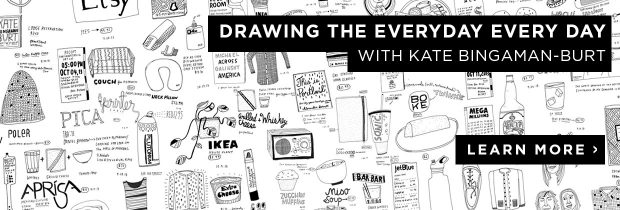The post was authored by Emily Potts with contributions from Whitney Sherman.
Whitney Sherman is an award-winning illustrator and director of the MFA in Illustration Practice at Maryland Institute College of Art. She is also author of Playing with Sketches, 50 creative exercises for designers and artists (Rockport Publishers).
We asked Sherman for advice on how to draw or improve your drawing skills. She also offers up five drawing exercises from her book to help anyone get started.
If you’re looking for more resources on how to hone your design skills, check out our classes on Hand Lettering, Creating a Knockout Portfolio, Logo Design, and Photoshop tutorials.
Why do you think it’s so hard for people to get started with drawing or figure drawing?
For non-artists, I think that the culture of drawing is not extended or continued with or for them beyond early childhood. Grade schools and high schools, for the most part, value math and science over the arts, which gets cut out when budgetary pressures arise. What is then neglected is the haptic qualities of “making,” which can contribute to retention of learning as well as foster communication. If a non-artist is only shown an example of classical or academic drawing, they will be thwarted by not having those skills. If encouraged to make native marks [draw in their own way] and be respected for that, most people would grow up with less doubt on their ability to draw and would enjoy the process, which is a very important part of drawing!
For creative people who are working in mediums other than drawing, some of the reasons are the same – recognizing and celebrating native marks, but I think it goes a bit farther to include practice. Creatively leaning people continue drawing beyond childhood for longer than most, yet their particular area of creative focus as an adult may have not required the use of drawing, and so it is left behind, unpracticed. In both cases, having permission [from a teacher, from one’s self] to draw as one does, to appreciate that and practice it will foster comfort and confidence with drawing.
I had a drawing teacher in college who said, “Draw what you see, not what you know.” Do you find that holds true for everyone?
Although I can’t say I know how everyone behaves, I do think that extended focus is very hard for most people. Numerous conditions and environments discourage this. Have you ever been bored because it feels like nothing is happening? If so, you are probably less likely to be able to focus on what is going on around you. The ability to quiet your mind and observe is central to the theme your teacher was addressing. Knowing involves conceptual thinking with additional abstract qualities based on memories of the circumstances surrounding the knowledge (Was there a smell in the air that caused us to form an opinion?). Seeing, on the other hand, requires that we participate with what is currently happening, and letting go of memory. Time is a key ingredient of seeing, although like many things, practice helps our seeing happen faster. If you purposefully act to see, you can then make the observations that allow you to translate your seeing into mark making.
Copy thank you















0 comments:
Post a Comment